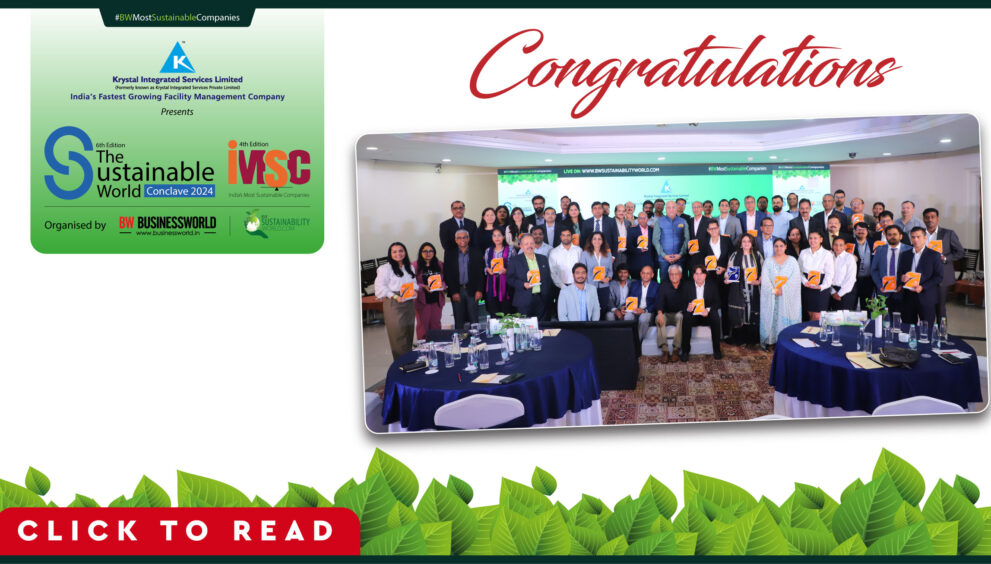IMSC 2024: Sustainability Leaders Across Key Sector

Organisations that are at the forefront of integrating sustainability into their core business strategies, exemplifying a balanced approach to environmental stewardship, social responsibility and ethical governance
In an age where sustainability is a business imperative, Indian companies are stepping up to lead the global charge towards environmental and social responsibility. BW India’s Most Sustainable Companies (IMSC) 2024 recognises these trailblazers. These firms exemplify how businesses can drive positive change while achieving long-term growth.
The Evaluation Process
In response to industry feedback, the fourth edition of the IMSC adopted a more robust, two-tiered process to finalise the rankings. In the first phase, BW Businessworld collaborated with Bilancia Consulting as the Knowledge Partner to analyse the most recent data. The second phase introduced an Advisory Council, composed of industry leaders and domain experts, to provide deeper insights and contextualise the data across various sectors. This addition ensured a more comprehensive evaluation, reflecting each industry’s unique challenges and opportunities enhancing the credibility and relevance of the final rankings.
Phase One
In this phase, a thorough evaluation across three key pillars—environmental, social, and governance (ESG) was undertaken. This methodology incorporated 36 key performance indicators (KPIs) derived from the Business Responsibility and Sustainability Reporting (BRSR) or Annual Integrated Report (AIR) for FY 2023-24. The KPIs cover critical aspects such as climate strategy, water and waste management, human capital management, governance structures and ethical business practices.
For environmental factors, companies were assessed based on emissions intensity (Scope 1, 2, and 3), renewable energy usage, water intensity and waste disposal percentages. Social factors evaluate human capital management, employee training, occupational health and safety, and community relations, including compliance with corporate social responsibility (CSR) mandates as per SEBI guidelines. In the governance domain, criteria such as sustainability governance, CEO-to-employee pay ratios, and risk management of ESG matters were considered.
Each KPI is assigned a specific weightage, varying by industry domain—industrial or service—to reflect each sector’s unique ESG challenges and opportunities. The methodology ensures a tailored and fair assessment, resulting in a detailed ranking based on a company’s overall sustainability impact.
Bringing In Context
Phase two involved an Advisory Council. This council comprised 15 industry leaders, including CEOs, managing directors, and chief sustainability officers, who built on the initial evaluation. The council reviewed the results of the first phase and brought their expertise to weigh in on the sustainability efforts of each company. They provided context, relevance and significance to the numbers by assessing each company’s long-term vision, governance practices and innovation in sustainability. This deeper analysis allowed for a more nuanced understanding of each company’s environmental and social responsibility contributions.
Two influential councils guided the awards. The Strategic Leadership Council included industry captains such as Sunil D’Souza, CEO, Tata Consumer Products; Mainak Dhar, Managing Director, McCain Foods; Dr. Annurag Batra, Editor-in-Chief, BW Businessworld; Sudhir Mishra, Managing Partner, Trust Legal; Srinath Sridharan, Corporate Advisor and Chetan Savla, President – Sustainability, Kotak Mahindra Bank.
Meanwhile, the Sustainability Council, featured domain experts like Ratnesh Jha, Executive Director, UN Global Compact Network India; Shilpashree Muniswamappa, Director – ESG, Colgate-Palmolive; Jerome Gnanaprakasam, Global Head – Sustainability, Dr. Reddy’s; Chandni Khosla, Board Advisor, Sustainability; Pradeep Panigrahi, Head – Corporate Sustainability, Larsen & Toubro; Thakur Pherwani, Chief Sustainability Officer, TVS Motors; Tejashree Joshi, Head – Environmental Sustainability, Godrej & Boyce; Deepa Nagraj, Global Head of Communications, Mphasis dove deeper into the specific sustainability initiatives each company had implemented.
This phase ensured a comprehensive, qualitative review that went beyond just metrics to include the real-world impact and innovation brought by these companies.
Industry-wide Commitment To Sustainability
The most sustainable companies, representing a wide array of industries, have proven that sustainability can coexist with profitability, innovation and competitive advantage.
From Mahindra & Mahindra’s industry-leading initiatives in electric vehicles and clean energy to Tata Consumer Products’ focus on water conservation and sustainable sourcing, these companies are setting new benchmarks. Their efforts encompass diverse strategies, including carbon footprint reduction, circular economy practices, water conservation and sustainable infrastructure development.
Tied rankings, such as Mahindra & Mahindra and Tata Consumer Products at second place or ABB India and Tech Mahindra in fourth place; Tata Consultancy Services and ITC in eleventh place; Dr. Reddys Laboratories and Apollo Tyres in 14th place; Tata Steel and Grasim Industries in 27th place; Ashok Leyland and Mahindra & Mahindra Financial Services in 34th, signify the equally impactful contributions of these organisations. Companies such as these demonstrate that sustainability is no longer an add-on but a core component of business strategy.
The IMSC celebrates individual achievements and a growing movement towards responsible business in India. These companies are leading the way in embedding sustainability into their core business strategies, proving that success in the 21st century is about creating value for both shareholders and society at large. As these businesses continue to innovate, they are shaping the future of a greener, more responsible India.








































































































































































































































































































































































































































































































































































































































































































































































































































































































































































































































































































